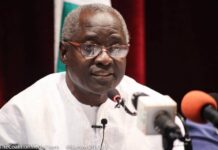There is a notable element in the composition of the High Court as provided for in S.131 (1) creates a conflict between the role of the Chief Justice as a Judge of the Supreme Court and his role as a Judge of the High Court. By virtue of S.125 (1)(a) and 125(3) of the Constitution, the Chief Justice is a Judge of the Supreme Court and presides at sittings of that court. In this capacity he or she hears appeals from the decisions of the Court of Appeal on appeals from the decisions of the High Court by virtue of Ss.126 (1) and S.128 of the Constitution.
In his or her capacity as a Judge of the High Court, the Chief Justice can hear and determine all Civil and Criminal proceedings as provided in S.132 and 133 of the Constitution. The challenge here, and which has occurred in some situations, is where he or she deals with a case as a Judge of the High Court, if the case is the subject of a further appeal to the Supreme Court, he or she certainly cannot participate in the hearing of such a case at the Supreme Court.
Furthermore, the fact that it is the Chief Justice that gave the decision that is the subject of the further appeal to the Supreme Court may influence his colleagues in the Supreme Court in their determination of such an appeal. Although this may appear to be a remote probability, it is advisable that it should not be ignored. This is more so as it is the Chief Justice that convenes and constitutes the panel of the Supreme Court that hears each case. This situation will render vulnerable and therefore suspect the independence of the panel of the Supreme Court dealing with a case decided at the High Court by the Chief Justice.
There is no doubt that there can be situations where the Chief Justice is a former Judge of the High Court and matters decided by him as such High Court Judge reach the Supreme Court by means of further appeals. The challenge here is, it is not a permanent one as it can only last with the subsistence of such cases. Once such cases are disposed off the challenge ceases to exist. S.131 (1) creates a challenge that will remain permanent until it is amended to exclude the Chief Justice from being part of the High Court.
There is also the challenge of when and how the Chief Justice can request a Supreme Court or Court of Appeal Judge to sit as a Judge of the High Court under S.131 (1)(c) of the constitution. In a situation where the High Court has enough Judges to hear a case, can such a request be justified? Such a request, when there are enough judges of the Court to hear a matter can create the suspicion that a Judge is being selected to hear a particular case to secure a particular result. This issue arose in the case of Muhammadou Sissoho v Inspector General of Police.
The Chief Justice is saddled with the responsibility of directly administering the High Courts and administering the entire Judiciary of the Gambia. This is no doubt a very difficult task and does not allow for full concentration on the direct supervision and administration of the High courts.
The Court structure of the High Court is larger than any of the other Superior Courts like the Supreme Court and the Court of Appeal. There are many divisions of the Court, with some sitting in Brikama, Mansakonko and Basse. The body of staff is large and the activities and responsibilities are varied and enormous. The present practice of leaving the direct supervision of the High Court structure to the Master of the High court has proven unworkable. The Master is a subordinate officer to a High Court Judge and so cannot supervise the Judge. The role of the Master in practice is reduced to that of providing administrative support to and supervision of the Court registries and other departments. The fact that the Master has the additional responsibility of supervising the large and wide Magistrate Court structure makes his or her job of supervising the High Court more difficult.
The High Court and Magistrates Courts are the most important courts in the Gambia in terms of access to Justice. Considering their scale of activities, responsibilities, large structure and personnel, it will be in the interest of effective and efficient administration of justice to amend the constitution to provide for a Judge as the head of the High Court as is the case with the Supreme Court and the Court of Appeal.
The better practice is to have a separate head for each tier of court with all being answerable to the Chief Justice. This will allow for a more direct and effective administration and supervision of the courts and allow the Chief Justice enough time and room to deal with the general administration of the country’s Judiciary and matters of Judicial Policy. There may be no need to go through the process of amendment of the constitution as a means of having a separate head for the High Court. By virtue of the general power vested in the Chief Justice to administer and supervise the courts, he or she can appoint a Judge to head the direct administration and supervision of the High Court.
Section 131(1)(a) of the Constitution which makes the Chief Justice part of the High Court is a hangover of the court regime in the Gambia where the High Court was the apex court in the Country. In spite of the developments that resulted in the existence of the Court of Appeal and the Supreme Court as Courts superior to the High Court, the successive constitutions after independence have continued to make the Chief Justice part of the High Court. The reasoning or notion underlying such a provision is not clear. The mischief it is meant to prevent is not clear. In the context of the Judicial hierarchy and the application of the rule of judicial precedent it is clearly absurd and will yield difficulties.



















